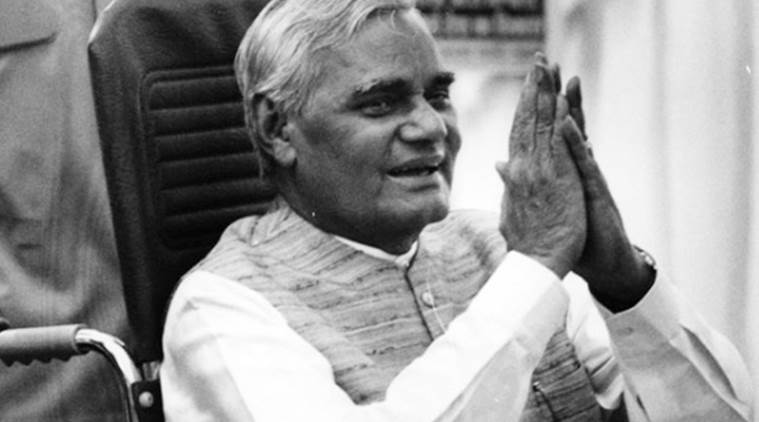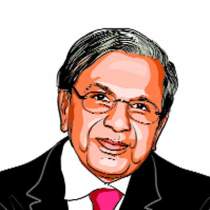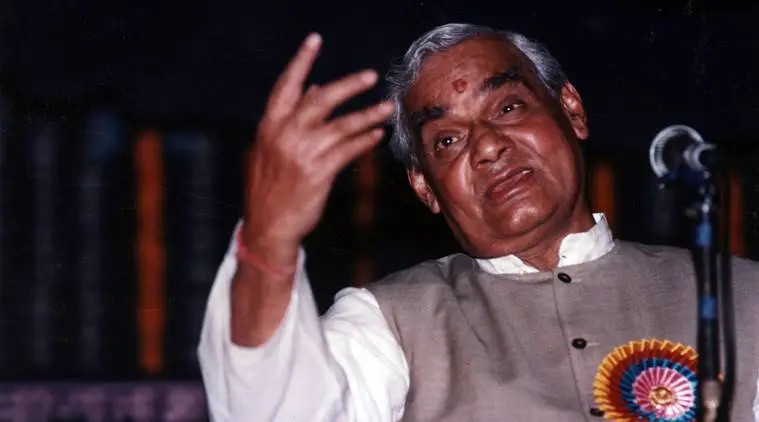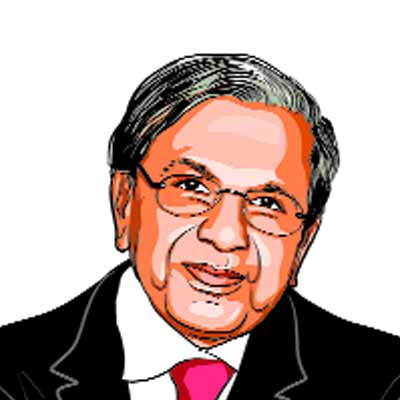Atal Bihari Vajpayee: The great balancer
Atal Bihari Vajpayee’s economic policies often faced resistance from his party. With wit and sagacity, he resolved many a contradiction.

Atal Bihari Vajpayee passes away at the age of 93. Here are the top 10 events that shaped Vajpayee’s PM tenure. (File)
An era cannot be compressed in a column. A legacy cannot be reduced to words. Atal Bihari Vajpayee was Prime Minister of India three times: For 13 days in 1996, 13 months from 1998 to 1999 and then from 1999 to 2004. He was an orator par excellence and a parliamentarian of exceptional calibre. Atal ji’s ability to dispel a moment of tension with poetry and wit is part of the country’s parliamentary lore. Atal ji was a unwell for some time. But we are gripped with overwhelming sadness at his passing away.
Under Atal ji, the BJP transcended its earlier image of a right-wing party with limited appeal — especially in its avatar as the Jana Sangh — and transformed into a national party. The popular notion of the BJP being a party of small traders and shopkeepers was dispelled and the party became a credible national alternative.
Atal ji’s multifaceted personality, large heartedness and readiness to forgive transcended ideological barriers. He ran a successful coalition government of 13 parties. His friends and admirers spanned the political spectrum.
I had the privilege of working with him closely as his secretary from August 1998 to January 2001. In1984, I had the opportunity to spend some time with him in Japan. His unfailing courtesy and his smile were disarming. When I congratulated Atal ji on becoming PM, he asked jokingly about the car in which I had fetched him personally from Tokyo’s Narita airport. Little did I realise that this would mark the beginning of a deeper engagement.
I made the terrible mistake of asking him what my responsibilities as a secretary would be. He looked at me and replied cryptically, “Everything”. But with humility, Atal ji also confessed that formal economics was not his forte and he expected me to advise him on all aspects of economic policy.
He asked me to constitute the Prime Minister’s Economic Advisory Council and a Council on Trade and Industry. He also asked me who would the most appropriate person to head the Economic Council. Without thinking much, I suggested the name of I G Patel. Atal ji smiled and asked me to try my luck. When I went to see Patel, he smiled as well and responded, “I’ll take it because I cannot say no to the prime minister twice.” Patel was referring to a cabinet responsibility, which the prime minister had offered him earlier. He could not accept it, given his failing eyesight.
A similar instance with regard to an appointment to the Council for Trade and Industry deserves to be recollected. I had suggested the name of the late R P Goenka as a representative from Eastern India. The then principal secretary had reservations, given Goenka’s proximity to the Congress. The PM laughed and said, “Today he may be close to the Congress, tomorrow it could be your turn”. He never allowed partisan considerations to come in the way of what he felt was appropriate.
The telecom tangle which he inherited could have stymied India’s developments in the field. Private telecom operators had made preposterous bids and were on the brink of defaulting. This would have ruined the companies and as well as the banks, which had generously lent them on optimistic assumptions. Atal ji wanted the matter resolved, whatever the cost. He was willing to even sacrifice the then telecom minister who had taken a moral view of the issue. The then Attorney General Soli Sorabjee and I held long sessions to draw up a revenue sharing model acceptable to the Supreme Court and the Government of India. This helped India regain its leadership role in the telecom sector. No one could have foreseen the Fourth or the Fifth Industrial Revolution. In many ways, Atal ji had the sagacity to do so.
For the FICCI Annual Conference Atal ji asked my colleague Sudheendra Kulkarni, his favourite speechwriter, for a big idea that could make a difference. He promptly accepted the suggestion for the East-West and North-South roadway corridors, later known as the NHDP. This was announced in Atal ji’s speech, two days later, on October 24, 1998.
Two months later, he asked, “If you have got this announced, will you implement it now?” Atal ji went on to add that he would not like “prime ministerial announcements to become the butt of jokes”. The only way this could be done was to create a non-lapsable fund to which the proceeds of the cess could accrue based on the securitisation of the future revenue stream. This needed overruling the conventional wisdom of the finance ministry on non-lapsable funds outside the Consolidated Fund of India. This Atal ji happily did. The NHDP could contract large borrowings and complete the programme in a finite time frame. The cess, which he had reminded us should finance the rural roads, ushered the Pradhan Mantri Gram Sadak Yojana.
At times, his economic decisions met with more resistance from his party than from outside. When I asked if policies needed recalibration given the resistance form his cabinet colleagues, he replied, “You do your work, which I believe is correct. I will do my work, which is to deal with the forces of resistance”. Fire-walling government from the party is never easy. He had the ability, goodwill and stature to harmonise contradictions — this few can match.
His path-breaking efforts on ties with the US and his visit to Pakistan represent the goodwill he had across nations. Atal ji’s principal secretary and National Security Advisor, Brajesh Mishra, who possessed a rare intellectual acumen, helped him take many complex decisions. The PM’s quiet support for the Jaswant Singh-Strobe Talbott dialogues helped overturn the Indo-US relations, which had strained following the Pokhran Nuclear Tests. The relations between the two countries developed into a strategic partnership.
The Vajpayee era was a watershed in economics and foreign policy. Never again will mainstream Indian politics turn back on forces of liberalisation, modernity and change. Never again will our foreign policy become inward looking.
The writer, chairman of the 15th Finance Commission, was Atal Bihari Vajpayee’s secretary from 1998 to 2001
For all the latest Opinion News, download Indian Express App
More From N K Singh
- Balancer Of ContradictionsTSR could be creative without breaking rules of the game, disturbing equilibrium..
- Pro-growth, pro-poorBy unearthing black money, demonetisation has widened the government’s revenue base, giving it more resources for welfare projects...
- For Bihar’s sakeFinancial rectitude and development focus are the USP of both Narendra Modi and Nitish Kumar. They have work to do together..

 Atal Bihari Vajpayee. Express archive photo by Mukesh Parpiani on 10.11.1995
Atal Bihari Vajpayee. Express archive photo by Mukesh Parpiani on 10.11.1995






































No hay comentarios:
Publicar un comentario